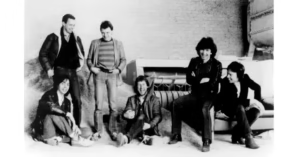Genesis: From Prog Visionaries to Pop Powerhouse
Genesis. Formation and Early Days (1967–1970)
Genesis was formed in 1967 at Charterhouse School in Surrey, England, by a group of students:
- Peter Gabriel – Vocals, flute
- Tony Banks – Keyboards
- Mike Rutherford – Bass, guitar
- Anthony Phillips – Guitar
- Chris Stewart – Drums (later replaced)
Initially nurtured by former Yardbirds producer Jonathan King, their debut album From Genesis to Revelation (1969) was orchestral pop in style and largely overlooked. After replacing Stewart with John Mayhew, and then later with Phil Collins, and eventually Steve Hackett replacing Phillips, the classic lineup emerged.
Genesis. The Progressive Rock Era (1971–1975)
With the arrival of Phil Collins (drums, vocals) and Steve Hackett (lead guitar), Genesis began crafting intricate, theatrical progressive rock.
Genesis. Key Albums:
- Nursery Cryme (1971): Introduced the fantasy-driven narrative style, with classics like “The Musical Box.”
- Foxtrot (1972): Includes the 23-minute epic “Supper’s Ready,” a masterpiece of prog storytelling.
- Selling England by the Pound (1973): A landmark album with “Firth of Fifth” and “Dancing with the Moonlit Knight”. It showcased Tony Banks’ classical style and Gabriel’s lyrical wit.
- The Lamb Lies Down on Broadway (1974): A double concept album and theatrical rock opera. Gabriel’s story of Rael — a Puerto Rican street punk in NYC — was ambitious, surreal, and visually stunning in live performance.
Genesis. Style and Performance:
- Peter Gabriel’s costumes and storytelling turned Genesis into a cult phenomenon.
- Their music blended English folklore, classical structures, and rock — with a focus on long-form composition.
Genesis. Transition and Phil Collins Era (1976–1991)
After Gabriel left in 1975 to pursue a solo career, drummer Phil Collins stepped forward as lead vocalist — a move met with skepticism, but ultimately transformative.
Key Albums:
- A Trick of the Tail (1976): A confident post-Gabriel debut, balancing prog with accessible melodies.
- Wind & Wuthering (1976): A romantic, melancholic record with standout track “Afterglow.”
- …And Then There Were Three… (1978): With Hackett now gone, the band became a trio (Banks, Rutherford, Collins), leaning toward more concise song structures. Features the hit “Follow You Follow Me.”
- Duke (1980): Marks the balance of pop appeal and prog ambition, with “Turn It On Again” and the semi-conceptual “Duke Suite.”
- Abacab (1981): Experimental and stripped-down, incorporating electronic textures and horn sections.
- Genesis (1983): A pop-prog hybrid with hits like “Mama” and “That’s All.”
- Invisible Touch (1986): Their commercial peak, with five hit singles, including the title track and “Land of Confusion.”
- We Can’t Dance (1991): Features the introspective “No Son of Mine” and the upbeat “I Can’t Dance.”
Evolution of Sound:
- In this era, Genesis evolved into a chart-topping pop-rock juggernaut, blending synths, hooks, and emotional storytelling.
- Though they faced accusations of “selling out,” they retained musical sophistication in rhythm and arrangement.
Later Years and Reunions (1992–2022)
After Phil Collins left the band in 1996, Genesis released Calling All Stations (1997) with Ray Wilson on vocals. The album received mixed reviews and marked the band’s first commercial decline.
Reunions:
- 2007 Turn It On Again Tour: Collins, Banks, and Rutherford reunited to perform classic material to sold-out arenas.
- The Last Domino? Tour (2021–2022): A farewell tour featuring Nic Collins (Phil’s son) on drums, due to Phil’s declining health. The band retired after their final show in London in 2022.
Legacy and Influence
Genesis’s legacy is multifaceted:
- Progressive Rock Pioneers: With albums like Foxtrot and Selling England, they were at the forefront of art-rock complexity and storytelling.
- Pop Giants: With Phil Collins, they achieved global commercial success without losing instrumental skill.
- Solo Careers: Members like Gabriel, Collins, and Hackett had acclaimed solo paths, broadening the Genesis influence across genres.
Genesis inspired generations of bands, from Marillion and IQ to Radiohead, Porcupine Tree, and Dream Theater. Their ability to reinvent themselves while retaining strong identity is rare in rock history.
Interesting Facts
- The band’s name was suggested by producer Jonathan King, referencing the “birth” of a new musical era.
- They sold over 150 million albums worldwide.
- The Lamb Lies Down on Broadway tour featured over 1,000 slide projections and elaborate costumes.
- Phil Collins’ drum sound became iconic in the 1980s and defined an era of music production.
- Genesis is one of the few bands whose prog and pop phases are both considered highly influential.




